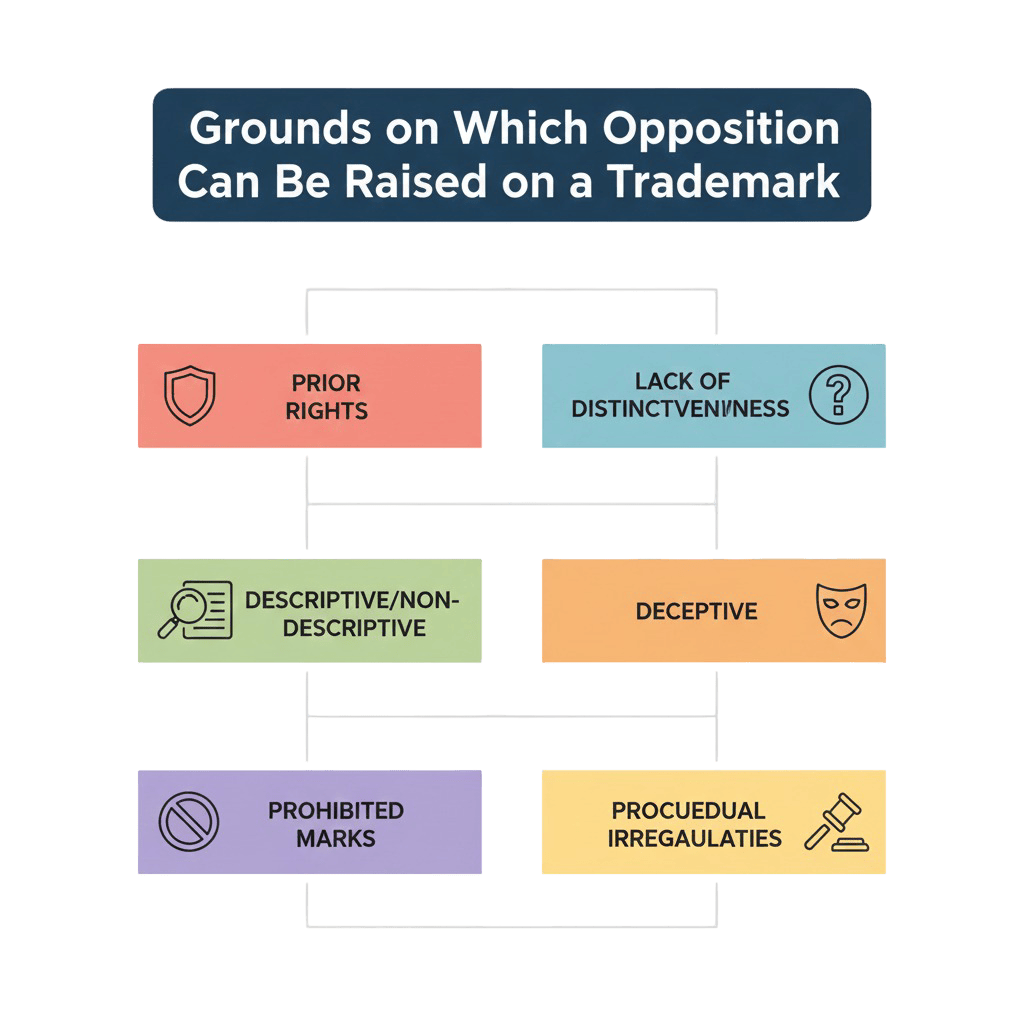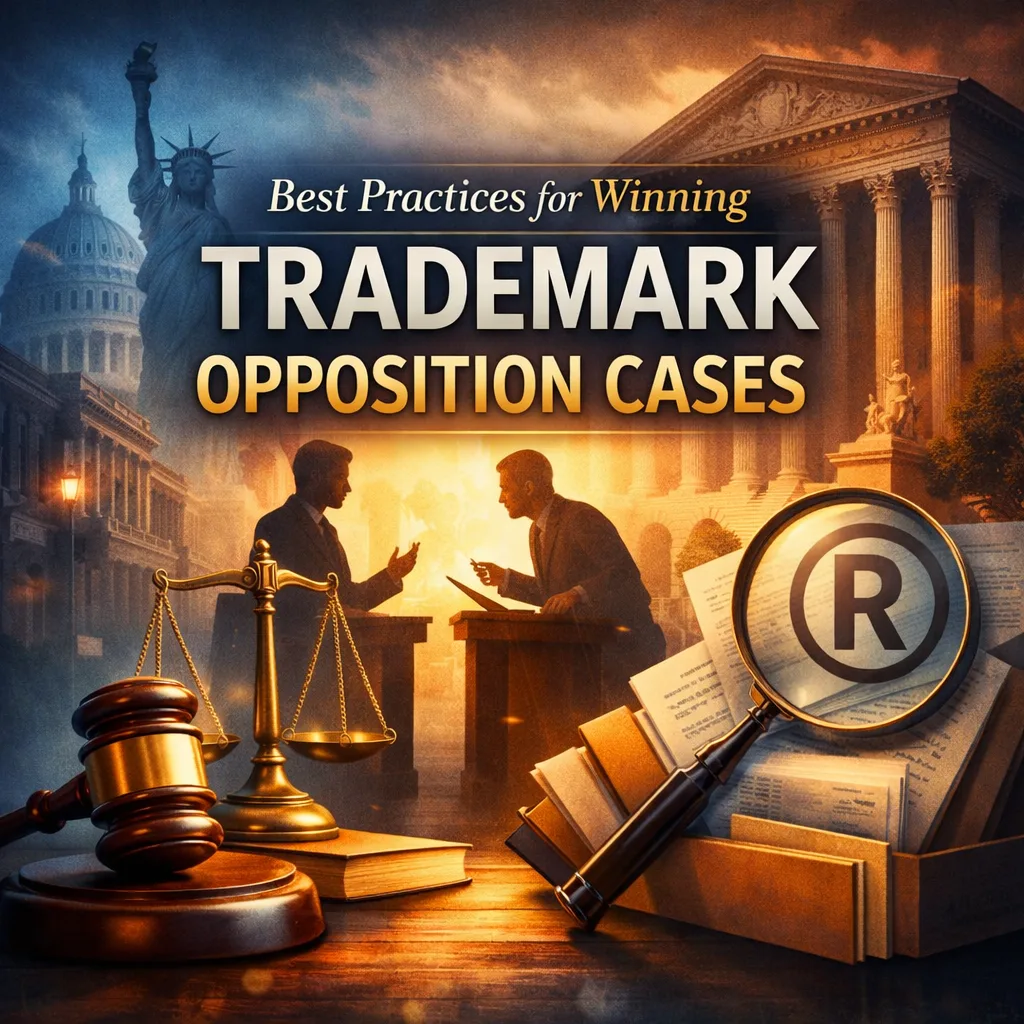OVERVIEW
What is Trademark Opposition?
In India, opposition to trademarks is a legal issue based on the Trade Marks Act, 1999, and the Trade Marks Rules, 2017 contain the elaborate procedural details. The main legal basis is found in Section 21 of the Trade Marks Act, 1999, which empowers any person to contest a trademark application, even if they do not have a registered trademark.
A trademark opposition is a legal challenge that is made in the form of a complaint against the non-grant of a trademark. It is a legal action taken by the existing trademark owners and the competitors, or any other interested parties to object to a trademark registration before the Trademark Registry grants it the protection of registration. It is a legal tool through which one can contest a rival's trademark application before it is officially recognized. Instead of allowing an infringement to happen and then engaging in an expensive litigation battle, opposition enables you to eliminate objectionable trademarks at the registration phase itself. It is a proactive and cost-effective way of securing your brand image and preventing your business from encountering legal issues in the future.

Types of Oppositions
Grounds on Which Opposition Can Be Raised on a Trademark
In India, any individual, business, firm, partnership, or trust with legal standing can raise an opposition to a trademark within 4 months of its publication.
Additionally, the trademark registry may also raise an objection against the applicant’s trademark. However, such objections are typically raised only if there is a valid reason.
Here are the grounds on which someone can file an opposition:
1. Lack of Distinctiveness:
The trademark does not convey any meaningful message or clearly represent what the company stands for. The logo should possess distinguishing features or include elements that reflect the quality, quantity, intended purpose, values, geographical origin, or production time of the goods/services.
2. Generic or Descriptive Terms:
Generic marks are those words that are used in common language to refer to a particular category of product or service (for example, "PIZZA" used for a pizzeria). On the other hand, descriptive marks explain the attributes, place of origin, quality, or purpose of the products (for instance, "BLUE" denoting the colour of ink used in pens).
2. Likelihood of Confusion:
The most common reason for opposition is this. A trademark similar or identical to an earlier registered trademark will not be allowed for registration, and the similarity will cause confusion among consumers.
3. Offensive Material:
According to the provisions of Clause 9(2)(b), a trademark must not contain matter that can be interpreted as hurting the religious feelings of any category or segment of Indian persons. The use of holy religious symbols, names of deities, or religious pictures on goods deemed improper (such as, for example, footwear or alcohol) might be considered as a challenge based on the grounds of hindrance to religious feelings.
4. Marks with Earlier Rights
A trademark can be opposed if it conflicts with earlier copyrights, registered designs, or geographical indications of another person. If you hold a copyright for a unique artistic design, and someone applies to register that same design as a trademark, you could oppose the trademark application based on your copyright rights.

Opposed
How to Know if Your Company’s Trademark Has Been Opposed
In India, when applicants apply to register their trademarks, the application is processed by the Trademarks Registry. Once the trademark is registered, you will be notified about the type of trademark registration granted.

Applicants can also monitor the status of their application through the online portal at ipindia.gov.in. If the trademark has been opposed, the status will show "Opposed."
Director of a Company or Partner of a Partnership
Any director or partner of a company or partnership can file an opposition if they believe that the applied trademark may infringe upon their existing rights or create confusion with their own trademark.
Owner of an Existing Trademark
The owner of a registered trademark has the legal right to oppose the registration of a new trademark if it is identical or similar to their own, which may lead to confusion among consumers.
Two or More Parties with Similar Trademarks
If two or more parties own similar or identical trademarks that could cause confusion in the marketplace, they have the right to file an opposition against the new trademark application.
Any Individual Representing a Company
Any individual, such as an employee or legal representative, can file a trademark opposition on behalf of a company if they believe that the new trademark conflicts with the company’s established rights.
Who Can File a Trademark Opposition?
-
Director of a Company or Partner of a Partnership: Any director or partner of a company or partnership can file an opposition if they believe that the applied trademark may infringe upon their existing rights or create confusion with their own trademark.
-
Owner of an Existing Trademark: The owner of a registered trademark has the legal right to oppose the registration of a new trademark if it is identical or similar to their own, which may lead to confusion among consumers.
-
Two or More Parties with Similar Trademarks: If two or more parties own similar or identical trademarks that could cause confusion in the marketplace, they have the right to file an opposition against the new trademark application.
-
Any Individual Representing a Company: Any individual, such as an employee or legal representative, can file a trademark opposition on behalf of a company if they believe that the new trademark conflicts with the company’s established rights.
Procedure
Trademark Opposition Process Online in India
The procedural steps are of utmost importance in the process of opposing a trademark. That is why the whole procedure is divided into several parts, each of which has its own deadlines and requirements. If you do not comply with the deadline, you will lose your opposition automatically.


Stage 1: Notice of Opposition (Rule 42)
Keep an eye on the official Trademark Journal periodically. Use Form TM-O (which can be found on the official Trademark Registry website or through your attorney) to submit a Notice of Opposition. Pay the stipulated fee of INR 2,700 per class (as per 2024-2025).
Stage 2: Counter-Statement (Rule 43)
When the Registrar has served your notice to the applicant of the trademark, he has to send a Counter-Statement in 2 months. If he doesn't do it, his application for a trademark is automatically considered abandoned. This is indeed an important provision: if a trademark applicant does not reply in time, the opposing party wins by default. If you are the Applicant who is Opposed: You will have to file a Counter-Statement using Form TM-O, dealing with each ground of opposition.
Stage 3: Evidence Submission - First Round (Rule 45)
You must submit an affidavit that includes proof of your opposition with evidence such as documentary proof like certificates of trademark registrations, Sales and invoices demonstrating large-scale use of your trademark, Marketing materials, ads, and other promotional documents, Consumer testimony or surveys depicting brand awareness, Proof of market presence in a specific area, and any other pertinent papers that prove your trademark's rights and strength.
Stage 4: Evidence Submission - Second Round (Rule 46)
They may submit an affidavit justifying why their trademark does not infringe on yours, providing proof of the mark's distinctiveness, presenting documents showing that they have the right to use the trademark, producing evidence of widespread and genuine use of the trademark in commerce (if applicable), and offering surveys or expert testimony to show that there is no likelihood of confusion.
Stage 5: Final Evidence Submission (Rule 47)
The opponent (you, if you filed the original opposition) has one month after the applicant's evidence is received to file a final rejoinder affidavit, if needed. This is the last chance to react to the applicant's evidence and to support your case with more documents, expert opinions, or counter-arguments.
Stage 6: Hearing and Decision (Rule 49)
The Registrar arranges a hearing and informs the two parties. Generally, the hearing date follows the completion of the stages for submitting evidence. It is up to both parties whether they want to attend the hearing (optional) and deliver oral arguments; the Registrar might question to make the evidence or arguments clearer. If you are absent at the hearing, your opponent may be rejected. If you do not agree with the Registrar's ruling, you can appeal it to the Intellectual Property Appellate Board (IPAB) within the specified period.
Opposition VS Cancellation
Trademark Opposition vs Trademark Cancellation
It is vital to realize that the opposition of trademarks and the cancellation of trademarks are processes that are different from each other and that they operate differently.
Trademark Opposition
- Timing: The application stage, before the trademark is registered, is when it is filed
- Objective: To make certain that a trademark does not get registered
- Grounds: The applicant can raise both absolute and relative grounds
- Applicability: Only for applications that are under examination or have been published for opposition
- Timeline: The application must be submitted within 4 months from the date of publication
- Cost: Generally, it is less costly than cancellation proceedings
Trademark Cancellation
- Timing: A trademark that has been officially registered becomes subject to cancellation after the registration. If you wish, you can withdraw it at any time after advertised and accepted.
- Objective: To take away or to cancel a trademark that is already registered.
- Grounds: The applicant can raise non-use, abandonment, genericness, or fraud in the registration process grounds.
- Applicability: It is applicable for any trademark that is already registered.
- Timeline: An application can be made anytime after accepted/registration.
- Cost: It is not costly.
If you happen to come across a conflicting trademark during the application stage, your best option would be opposition. It is a faster, less expensive and more likely to be successful option than post-registration cancellation.
Practices
Best Practices for Winning Trademark Opposition Cases
In order to win trademark opposition cases, it is important to follow best practices, which are based on successful cases and industry standards.

Act Immediately Upon Discovery
If you find a conflicting trademark in the Journal, then the very first thing you need to do is start collecting evidence and get your opposition ready. Time is not on your side; the 4-month deadline goes by really fast.
Conduct Thorough Comparative Analysis
No matter how strong your trademark is, do not only rely on its superficiality. Provide your findings in a detailed manner and show how consumers could perceive the marks through expert analysis.
Organize Evidence Strategically
Evidence should be organized in a very clear and convincing manner. The first thing that should be presented is your strongest evidence (registration certificate, sales records). Then follow with supporting documentation (marketing materials, testimonials), then comparative analysis and legal arguments.
Anticipate Counter-Arguments
In your mind, switch roles and become the applicant. What counterarguments will they make? How will they justify getting their application approved? Have your counterarguments ready beforehand.
Maintain Clear Records
Keep a record of everything that happens, dates, communications, evidence gathering, meetings. Having clear records is a sign of diligence and organization, which will affect the Registrar’s perception of your case.
Use Professional Support for Evidence Affidavits
The affidavits need to be legally accurate, logically arranged, and persuasive. The trademark attorneys who are experienced have the expertise to present the evidence in the most effective manner before the Trademark Registry.
Why Choose JustStart?
Why Choose JustStart for Trademark Registration Consultant Services?
JustStart is a leading legal services platform specializing in intellectual property protection for startups and businesses across India. With a team of experienced trademark attorneys and legal consultants, JustStart simplifies the opposition process and maximizes your chances of success.

Experience and Expertise:
JustStart's group consists of highly skilled trademark lawyers, legal advisors, and IP experts who are well-acquainted with the intricacies of Indian trademark laws and registry practices.
Track Record of Success:
JustStart has dealt with a large number of trademark oppositions successfully, thereby gaining in-depth knowledge of the factors that work and those that do not before the Trademark Registry.
Cost-Effective Solutions:
JustStart's fees are very reasonable when compared to other firms, and the company also provides clear and simple billing with no extra charges. Representation by an expert results in long-term financial savings by avoiding errors that are ultimately very costly.
End-to-End Support:
JustStart accompanies you in every step of the opposition process from the initial assessment to the final decision (or appeal).
Proactive Monitoring:
With the help of JustStart's monitoring services, you will always be aware of the vital publication dates, which means you will have the maximum time possible to ready a strong opposition.
Personalized Strategy:
A case is always an individual matter. JustStart sets up tailor-made opposition strategies for you according to your trademark, the opposing mark, and your corporate goals.
Transparent Communication:
You will get frequent notifications regarding the progress of your case, be aware of all the procedures, and have a very clear understanding of the strategy that is being used.
Locations
Trademark Opposition in Other States and Cities
FAQs
LET'S CLEAR ALL THE DOUBTS!
Trademark Opposition under Trademark Law in India is the act of raising objections against a company’s published trademark. This trademark is typically designed as a logo, a symbol, or image and represents a company’s values, beliefs, or core principles.
A trademark objection is a concern raised by the examiner or registrar, whereas trademark opposition in India is a concern initiated by the applicant or a third party.
Technically, when someone else uses the same trademark as your company, the other company is, in a sense, trying to steal away your goodwill, audience, and loyal customers.
Yes. Copying someone else’s copyrighted or registered trademark is an offensive crime.
If you copy someone’s trademark or design without the owner’s permission, it can cost you a case of intentional infringement of a registered trademark. As per criminal sanctions, the crime can attract a prison sentence which cannot be less than six months and can be extended up to 3 years.
Luckily, we have a dedicated section for how to register a trademark online with expert help. Now you can experience hassle-free trademark registration in a few simple steps under the guidance of legal professionals.
As already mentioned, any applicant can point out the errors in the published trademark by filling out an application online to the trademark registry. The government body also facilitates an online service to ease the process. However, some applicants may find the digital process complex, for which they can hire a professional consultancy for guidance.
As a matter of fact, yes. You may need to submit a list of documents to the Trademark Opposition Process in India. You can formally challenge the issues in published trademarks.
The process of trademark rectification may take up to 4–6 weeks to receive approval.
Typically, the government will send a notice of opposition to the applicant and the opposer. The trademark registry will give time to the applicant to respond to the case (30 days). If the applicant fails to respond, the opponent may win the case.
In India, trademarks are protected for a period of 10 years after a successful registration. Once the validity expires, companies usually need to re-apply to get their trademarks registered once again.
In case you don’t respond to the opposition raised against the published trademark, the application is marked as abandoned.


